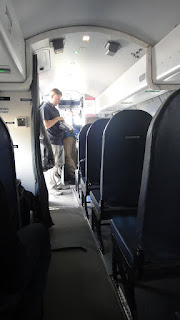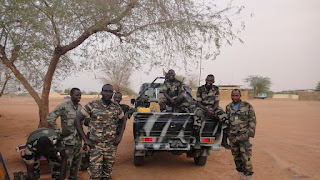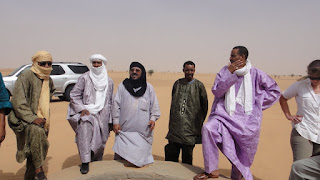This past week some colleagues and I went to the Northern part of Niger, close to Algeria, to assess the possibility of expanding our work in that part of the country. Because there are no domestic flights to that part of the country and it would've taken days to drive there, we flew on a humanitarian aid plan operated by the U.S Air Force.
 |
| Our plane to Arlit |
 |
| Inside the plane |
That part of Niger is predominately desert and most of the people that live there are Tuaregs, who have for centuries lived as nomads wandering from oasis to oasis, constantly in search of water for themselves and their livestock.
 |
| Tuaregs at an oasis |
In the mid-1960s a French multinational mining company discovered that underneath all of that sand was huge supply of uranium. The company came and created a town, Arlit, for the sole purpose of catering to the needs of the Nigeriens working at the mining company. The mining company designed the town and built the houses, the hospital, the grocery stores, and the restaurant.
 |
| Mining for Uranium |
In 2006 the little mining town in the desert became well known after a few expatriates were kidnapped and held for ransom. Because of that and the political situation in Niger and neighboring Libya, almost all of the NGOs left the area. Recently the area has become more stabilized, however we had to be accompanied by both Nigerien and American armed forces everywhere we went.
 |
| Our Nigerien escorts |
The first day we were there we wanted to do an assessment of a local village. We, and a Civilian Affairs team from the US military, first stopped at the Prefet's (regional authority) office to announce our presence and explain our plans. While we were meeting with the Prefet and his officials, another well-dressed man came in and announced that he would lead us to where we wanted to go. So he, and his two car entourage, and us in our four car entourage went tromping through the desert in search of women and men we could talk to about their life and do a water assessment.
After about two hours of wandering through the desert we finally found some people huddled under the shade of one of the few trees around. Myself and a colleague asked the women questions about their access to education, health services, food, and their livelihoods.
 |
| One of the women and her son we interviewed |
They explained to us their life as nomads, staying in one place as long as there was water, but never long enough to send their children to school for any length of time. Their diet consists of millet and rice with the occasional camel and goat milk. When we asked about if the women breastfeed their children and for how long, they explained that they first give their children sugar water and typically breastfeed their sons for two year and their daughters for one year. They explained to us that they breastfeed their son longer so that he will be more intelligent. After they were finished telling us about their life, I saw one women give a baby a bowl of brown water to drink. The nomadic life is a isolating, difficult one demanding fortitude and perseverance in both mind and body. The women explained to us their many needs and discerning if and how to help well is challenging. How do you provide health and nutrition education for a group of people when you do not know where they will be in the next month? Follow them on a camel through the desert?

And if the best way to start working with a community is to learn from them, what does it mean to live a life of moving from spring to spring in the desert?
To survive at all, the desert dweller--Tuareg or Aboriginal--must forever be naming, sifting, comparing, a thousand different "signs"--the tracks of a dung beetle, or the ripple of a dune--to tell him where he is; where the others are; where rain has fallen; where the next meal is coming from.
Chatwin, The Songlines








What a life! To live as a nomad in the desert. I cannot imagine it. I will pray that you will have ideas and wisdom on how to best help these people. Once again, thank you for sharing and I love the pictures too. They really help know more about your life and the ones you meet.
ReplyDeleteMy name is hoover, my 18 year old daughter, Tricia was diagnosed with herpes 3 years ago. Since then, we have moved from one hospital to another. We tried all kinds of pills, but every effort to get rid of the virus was futile. The bubbles continued to reappear after a few months. My daughter was using 200mg acyclovir pills. 2 tablets every 6 hours and 15g of fusitin cream. and H5 POT. Permanganate with water to be applied twice a day, but all still do not show results. So, I was on the internet a few months ago, to look for other ways to save my only son. Only then did I come across a comment about the herbal treatment of Dr Imoloa and decided to give it a try. I contacted him and he prepared some herbs and sent them, along with guidance on how to use them via the DHL courier service. my daughter used it as directed by dr imoloa and in less than 14 days, my daughter recovered her health. You should contact dr imoloa today directly at his email address for any type of health problem; lupus disease, mouth ulcer, mouth cancer, body pain, fever, hepatitis ABC, syphilis, diarrhea, HIV / AIDS, Huntington's disease, back acne, chronic kidney failure, addison's disease, chronic pain, Crohn's pain, cystic fibrosis, fibromyalgia, inflammatory Bowel disease, fungal nail disease, Lyme disease, Celia disease, Lymphoma, Major depression, Malignant melanoma, Mania, Melorheostosis, Meniere's disease, Mucopolysaccharidosis, Multiple sclerosis, Muscular dystrophy, Rheumatoid arthritis Alzheimer's disease, parkinson's disease, vaginal cancer, epilepsy Anxiety Disorders, Autoimmune Disease, Back Pain, Back Sprain, Bipolar Disorder, Brain Tumor, Malignant, Bruxism, Bulimia, Cervical Disc Disease, Cardiovascular Disease, Neoplasms , chronic respiratory disease, mental and behavioral disorder, Cystic Fibrosis, Hypertension, Diabetes, Asthma, Autoimmune inflammatory media arthritis ed. chronic kidney disease, inflammatory joint disease, impotence, alcohol spectrum feta, dysthymic disorder, eczema, tuberculosis, chronic fatigue syndrome, constipation, inflammatory bowel disease. and many more; contact him at drimolaherbalmademedicine@gmail.com./ also with whatssap- + 2347081986098.
ReplyDelete